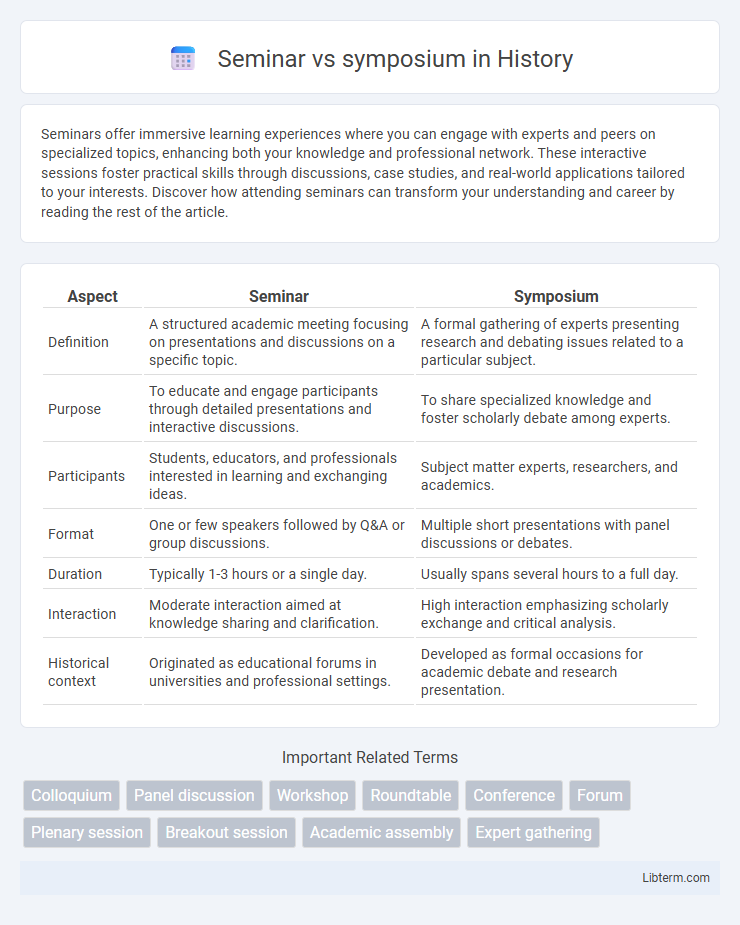Seminars offer immersive learning experiences where you can engage with experts and peers on specialized topics, enhancing both your knowledge and professional network. These interactive sessions foster practical skills through discussions, case studies, and real-world applications tailored to your interests. Discover how attending seminars can transform your understanding and career by reading the rest of the article.
Table of Comparison
| Aspect | Seminar | Symposium |
|---|---|---|
| Definition | A structured academic meeting focusing on presentations and discussions on a specific topic. | A formal gathering of experts presenting research and debating issues related to a particular subject. |
| Purpose | To educate and engage participants through detailed presentations and interactive discussions. | To share specialized knowledge and foster scholarly debate among experts. |
| Participants | Students, educators, and professionals interested in learning and exchanging ideas. | Subject matter experts, researchers, and academics. |
| Format | One or few speakers followed by Q&A or group discussions. | Multiple short presentations with panel discussions or debates. |
| Duration | Typically 1-3 hours or a single day. | Usually spans several hours to a full day. |
| Interaction | Moderate interaction aimed at knowledge sharing and clarification. | High interaction emphasizing scholarly exchange and critical analysis. |
| Historical context | Originated as educational forums in universities and professional settings. | Developed as formal occasions for academic debate and research presentation. |
Understanding Seminars and Symposiums
Seminars are interactive sessions designed for in-depth exploration of specific topics, often featuring presentations followed by discussions to enhance participant understanding. Symposiums are formal gatherings where experts present research findings or innovations, emphasizing the dissemination of knowledge within a professional community. Understanding the distinct formats aids in selecting the appropriate event type for collaborative learning or scholarly exchange.
Defining Key Features of Seminars
Seminars are interactive educational sessions that emphasize participant engagement, typically involving expert-led presentations followed by discussions or workshops. They often have smaller groups to foster in-depth exploration of specific topics, encouraging active learning and question-driven dialogues. The key features of seminars include focused content delivery, collaborative learning environments, and opportunities for networking and skill development.
Key Characteristics of Symposiums
Symposiums are formal gatherings focused on presenting and discussing specific academic or professional topics, often featuring multiple expert speakers and a structured agenda. They emphasize interactive dialogue among specialists, promoting in-depth exploration and exchange of research findings or innovations. Symposiums typically involve smaller, more specialized audiences compared to seminars, facilitating targeted networking and collaboration opportunities.
Primary Objectives: Seminar vs Symposium
Seminars primarily aim to educate participants through detailed presentations and interactive discussions on a specific topic, fostering deeper understanding and skill development. Symposiums focus on presenting multiple expert viewpoints and research findings, encouraging scholarly debate and sharing of cutting-edge knowledge within a particular field. Both formats facilitate knowledge exchange but differ in structure and depth of audience engagement.
Differences in Structure and Format
A seminar typically features a smaller group of participants engaged in interactive discussions led by a single expert or presenter, fostering in-depth exploration of a specific topic. In contrast, a symposium involves multiple speakers presenting individual research findings or viewpoints sequentially, often with a broader audience and less direct interaction. The structure of seminars emphasizes participant involvement and dialogue, while symposia prioritize formal presentations and knowledge dissemination.
Participant Roles and Involvement
In seminars, participants actively engage through discussions, asking questions, and sharing personal insights, fostering a collaborative learning environment. Symposiums typically feature experts or specialists presenting research or viewpoints, with limited audience interaction mainly during Q&A sessions. The participant role in seminars emphasizes active involvement, while symposium attendees primarily listen and selectively contribute.
Types of Topics Discussed
Seminars typically focus on specialized topics within a particular field, emphasizing in-depth analysis and practical application, often involving case studies or detailed research findings. Symposiums cover a broader range of subjects or multiple perspectives on a common theme, encouraging interdisciplinary dialogue and presenting diverse viewpoints from various experts. Both formats aim to enhance knowledge exchange but differ in scope; seminars dive deeply into niche topics, while symposiums explore comprehensive themes through varied presentations.
Benefits of Attending Seminars vs Symposiums
Seminars offer interactive learning experiences that enhance deep understanding of specific topics through direct engagement with experts, ideal for professionals seeking practical skills and knowledge application. Symposiums provide a platform for presenting cutting-edge research and networking with a diverse group of scholars, fostering collaboration and exposure to multiple perspectives in a specialized field. Attending seminars benefits individuals focused on skill development, while symposiums excel in advancing academic discourse and building professional connections.
Choosing the Right Event: Factors to Consider
Choosing the right event between a seminar and a symposium depends on the purpose, audience size, and level of interaction desired. Seminars typically involve focused presentations with opportunities for participant questions, ideal for in-depth learning or training sessions, while symposiums gather experts to discuss specific topics in a formal setting, suited for sharing diverse research or viewpoints. Consider the event's goals, participant engagement, and topic complexity to select the most effective format.
Summary: Seminar or Symposium, Which Suits Your Needs?
Seminars emphasize interactive learning and practical skill development through focused presentations and discussions, ideal for smaller groups seeking in-depth understanding. Symposiums gather experts to present diverse research findings on a specific topic, suited for large audiences aiming to explore multiple perspectives. Choosing between a seminar or symposium depends on whether you prioritize hands-on engagement or broad knowledge dissemination.
Seminar Infographic

 libterm.com
libterm.com